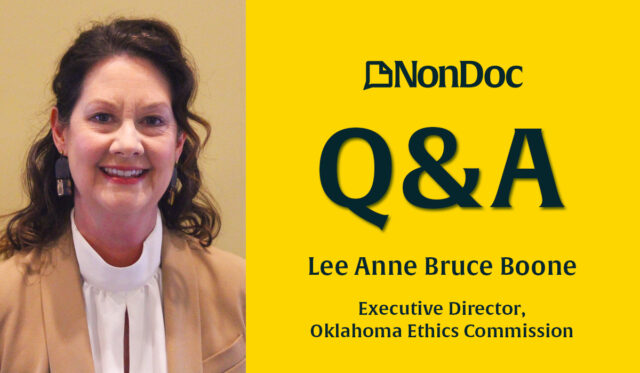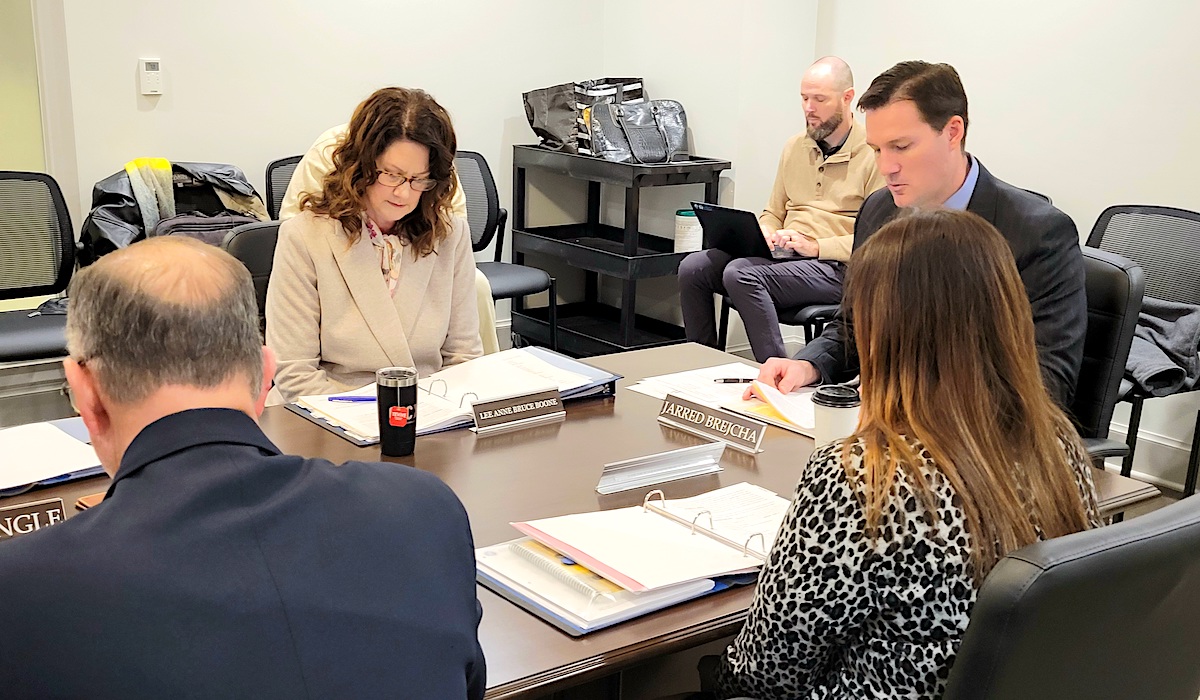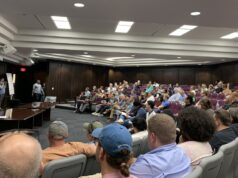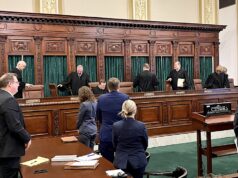
Lee Anne Bruce Boone was named the fourth executive director of the Oklahoma Ethics Commission on Dec. 7, and she began her new duties Jan. 4. Now tasked with running the agency that tracks activities of lobbyists, political candidates and political action committees, Bruce Boone has a long history of working in the public sector.
Before being hired as the Ethics Commission’s executive director, she served as the chief accountability officer for the Oklahoma State Department of Health, where she coordinated audits and investigations. She also performed risk management reviews for the agency. Prior to that, she served as chief of staff at the Oklahoma Department of Human Services, where she guided strategic planning and developed performance indicators to help with greater transparency.
She also has experience in fiscal management, coordinating the administration and allocation of financial resources, a pair of skills she will need at the Ethics Commission. Since voters approved creating it in 1990, the Ethics Commission has been historically underfunded by the Oklahoma Legislature. In addition to the executive director, the Ethics Commission has four other employees.
In the following Q&A, Lee Anne Bruce Boone discusses her background, her goals for the Ethics Commission and the long-standing need for additional funding. The following conversation has been edited lightly for clarity, length and style.
Where did you grow up, and where did you go to law school? Tell us how you ended up heading a state agency. Were you always interested in working in the public sector?
My father was a Southern Baptist pastor, so we did move around a bit. I was born in North Carolina, but we moved to Tennessee when I was a child, and I split my growing-up years between east Tennessee and Nashville. No one in my family was a lawyer, but I was frequently told I could hold my own in an argument and that I should consider law school. I took that to heart and never looked back. I went to a small private Christian university and then on to the University of Tennessee College of Law. Because I didn’t grow up around attorneys, I didn’t have any preconceptions of what I might want to do with a career in the law, but I knew I wanted to make a difference.
I spent most of my formative years in rural east Tennessee, much like rural Oklahoma, and saw the deep needs of those around me. My father demonstrated a life of service, and I remember giving up many a family trip or event when a personal or family crisis required his help. That made a huge impact on me, and while I knew I wanted to have a career, I wanted to know my work was an investment in my community. I briefly tried the traditional law practice, but that wasn’t fulfilling. So I began my career in public service with the Department of Human Services in Tennessee. They don’t do a great deal of training on leadership in law school, but I had tremendous mentors who demonstrated servant leadership. I was asked by the governor (Phil Bredesen at the time) to lead a task force regarding unifying administrative appeals that were somehow divided between different state agencies resulting in confusion and duplication of efforts, and then I was tapped to lead the appeals division afterwards. That was the start of my leadership role in state government, and it has led me to this role here at the Ethics Commission.
The Ethics Commission has been understaffed and underfunded for the past two decades. Why did you apply for the post of executive director of the Ethics Commission? What differences or similarities do you see with your previous state job, the OSDH’s chief accountability officer, which involved investigating allegations of wrongdoing and misbehavior by department personnel?
I have followed some of the news of the Ethics Commission while working here in Oklahoma, and I frequently utilized its resources in advising state officers and employees regarding conflicts of interest and other matters. The previous director’s departure was highlighted in the news, and I saw this as a tremendous opportunity to continue my career path of service. I have worked with the Legislature in previous roles and really relished the idea of returning to that, working with all branches of government and state employees as well.
One of the skill sets the commission was looking for was previous investigatory experience, and while I do not anticipate routinely performing investigations myself, the ability to lead the investigatory process and understand the importance of ensuring due process for everyone is integral to this role. I saw myself as a partner to the Health Department in ensuring investigations were completed not just timely, but fairly, and to maintain confidentiality and mitigate risks, all while educating employees regarding the role of the Office of Accountability. That same opportunity to partner with those we serve is available here, and I value the input of the Legislature, lobbyists and employees who are regulated by the rules of the Ethics Commission.
What are your goals as executive director? What can be done to improve compliance of filing required reports by candidates and lobbyists?
Since my start here, I have been looking for opportunities to connect with those served by the Ethics Commission and identify the misconceptions regarding the commission and those regulated by it. I am sitting down with stakeholders to learn what is working well and where we need to make improvements. First and foremost, I want to represent the commission and its mission well and ensure we renew our focus on education. A quick review of the data indicated that neglecting education has resulted in a sharp increase in noncompliance and fines. Forgoing those opportunities to educate ultimately makes the Ethics Commission’s job more difficult and causes a lot of angst among those we regulate. I have a list of “quick wins” on the board in my office, and each of them involves either a partnership or educational opportunity for our agency.
You started your new position in an election year. What can the Ethics Commission do to make campaign reports easier for candidates to file and for the public to view?
While we don’t have a mechanism to change the viewing capability of campaign reports in the current system, we are reviewing the availability and transparency of these reports now for modernization of our system beyond February 2025.
RELATED
New Ethics Commission director gets Guardian System extended for 2024 election by Tres Savage
Public service announcements to inform people of the report-viewing availability is something our staff have suggested, which I plan to explore during this campaign season for transparency. Often, members of the public are unaware of the ability to review reports as a part of candidate consideration. The majority of those who run for office strive to ensure they are compliant, and the public can access that information to utilize in determining whom to support.
Currently, one of my goals is to simplify all we can for our staff so we ensure that reporting and feedback loops are timely and efficient. From the educational front, I plan to implement additional training via online videos, FAQs and webinars on the Guardian System, the commission’s online database that tracks campaign financial information and lobbyist registrations. Additionally, if we are successful in receiving an increase in funding, we will have additional staff to assist candidates with reporting and also to speak with the public regarding questions in reviewing candidates’ information.
For Fiscal Year 2016, the commission received $837,000 from the Legislature. Its appropriation for the current fiscal year is $687,900. In recent years, the commission’s dynamic with both legislative chambers has been strained owing to significant investigations and settlements involving influential legislators in both the Senate and the House. After appearing recently before both House and Senate appropriations committees, how do you think your budget request conversations are going?
I have been encouraged by my interactions with the whole of the Legislature, as well as my one-on-one meeting with legislators. I cannot speak to what has happened in the past, but I know that each person I have interacted with has been enthusiastic about the focus and direction of the commission, and each has been open to sharing his/her experiences with me. I value each conversation and am honored to represent the financial needs of the commission.
Yes, we need an increase in funding, but there is already an awareness of that and an interest in ensuring sufficient funding will be in place to focus on the modernization of the Guardian System and educational tools for the regulated community.
What is something people would be surprised to know about you?
I am a mother of five! I have always been interested in foster care, and I knew of the tremendous need for foster families in Oklahoma from working with the Department of Human Services. But I didn’t know if my family had that same interest and didn’t want to impress it upon them. I prayed privately for several years about it, and, after a while, my oldest daughter — who was in middle school at the time — made a PowerPoint on why our family should foster and possibly adopt. We began fostering not long after that, and now we have added two beautiful daughters to our family through adoption. I have children from 19 to the age of 3, and I’ll probably be the oldest mother at my youngest’s graduation, but we wouldn’t have it any other way.
You graduated from Carson Newman University in Tennessee and earned your law degree from the University of Tennessee College of Law. Tennessee is in the Southeastern Conference, which the University of Oklahoma just recently joined. Who will you be pulling for when the Volunteers play the Sooners?
I’ll be wearing my T-shirt that says, “I just hope y’all have fun!”






















